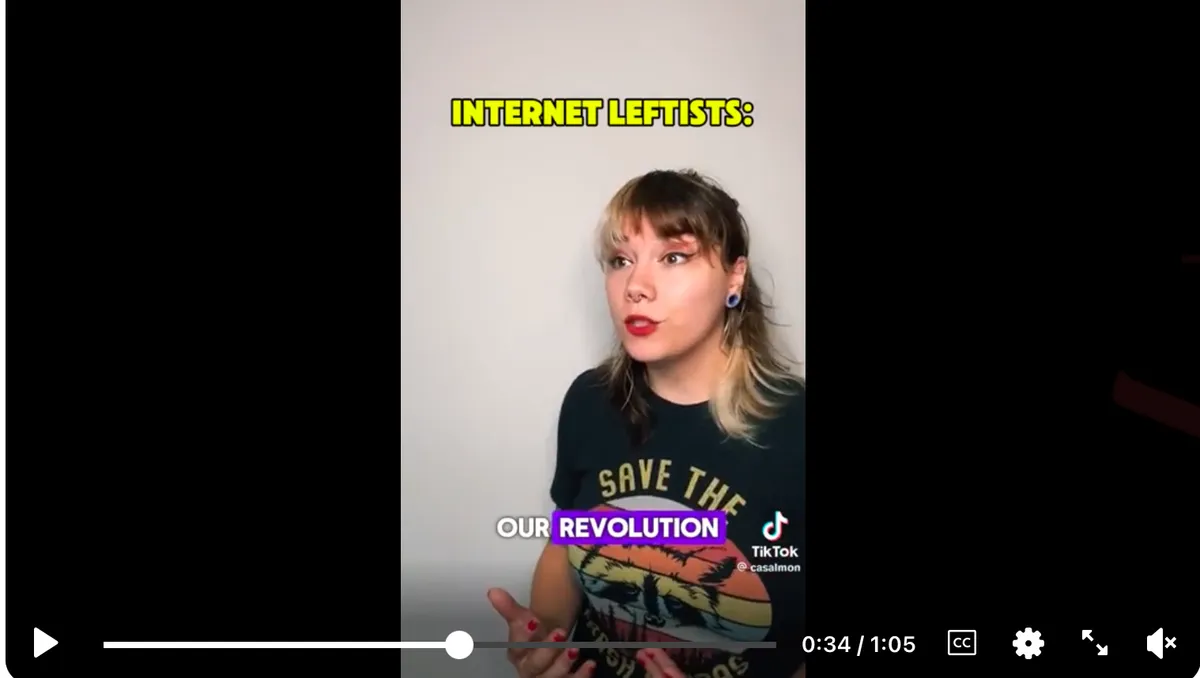This is not a critique of the following video—I agree with the spirit of this video, yet I caution against leaning too heavily on a perspective that, while emotionally satisfying in this moment of collective anger, risks oversimplifying complex dynamics. Yes, we are angry—but we must resist falling into familiar patterns. Directing our frustrations at the dysfunctional/internet left can inadvertently reinforce their inflated sense of importance. We really don’t want to do that, because they will never get to the work they need to do. The reality is that they hold little actual power. They function more as tools to neoliberalism than as agents of meaningful influence. Let me explain.
Now that we’re 100 days in, was she accurate?
by u/Zen1 in TikTokCringe
The assertion that the far left bears significant responsibility for democratic backsliding through voter disengagement warrants scrutiny, as it risks oversimplifying a multifaceted historical and structural phenomenon. While critiques of leftist ambivalence toward electoral participation are not without merit, such arguments often neglect the broader systemic forces that have methodically eroded democratic participation over decades. This critique reframes the discourse by situating it within a longer trajectory of institutional dismantling, strategic disenfranchisement, and neoliberal co-optation, thereby challenging the notion that leftist non-voting is a primary catalyst for political crisis.
Structural Foundations: From the Southern Strategy to Project 2025
The contemporary erosion of voting rights cannot be divorced from the Republican Party’s Southern Strategy—a mid-20th-century realignment that exploited racial animus to consolidate conservative power (Phillips, 1969). This strategy laid groundwork for voter suppression tactics that persist today, such as gerrymandering and restrictive ID laws, which disproportionately disenfranchise marginalized communities (Anderson, 2018). The unveiling of Project 2025, a Heritage Foundation-led initiative to centralize executive power, exemplifies the culmination of these efforts, reframing non-voting not as a leftist failure but as an outcome of decades of institutional sabotage (Heritage Foundation, 2023).
Legislative actions, including the Supreme Court’s 2013 gutting of the Voting Rights Act (Shelby County v. Holder) and the 1996 Telecommunications Act, further enabled structural disenfranchisement. The latter deregulated media, accelerating corporate consolidation and the rise of partisan echo chambers (McChesney, 1999), while the former legitimized voter suppression under the guise of states’ rights. These policies created conditions where marginalized and historically excluded voters—particularly Black, Latine, and low-income communities—face systemic barriers to participation (Berman, 2015).
Neoliberal Co-optation and the Nonprofit Industrial Complex
The critique of leftist “non-voting” narratives also overlooks the role of philanthropic capital in shaping political discourse. Foundations aligned with neoliberal interests have historically funded organizations promoting depoliticized narratives (e.g., “voting isn’t the only way”) while marginalizing groups advocating for structural reform (Incite! Women of Color Against Violence, 2007). This dynamic reflects what scholars term the nonprofit industrial complex, wherein systemic change is subordinated to donor-driven priorities (Rodriguez, 2007). Consequently, grassroots movements emphasizing direct action over electoralism are often incentivized to conform to apolitical frameworks, exacerbating disillusionment.
The Myth of Leftist Agency in a Right-Wing Project
To attribute significant agency to the far left in enabling authoritarianism is to misapprehend power dynamics. The “disaster” of democratic erosion is less a product of leftist apathy than of a deliberate conservative project to dismantle multiracial democracy (Lieberman et al., 2019). For instance, the Koch network’s decades-long investment in libertarian think tanks and judicial activism (Mayer, 2016) has reshaped policy far more decisively than any leftist abstention. Meanwhile, the Democratic Party’s own neoliberal turn—embracing corporate deregulation and carceral policies—alienated working-class voters long before online leftists amplified critiques of electoralism (Davis, 2017).
Conclusion: Beyond Individual Blame
Framing non-voting as a moral failing of the far left obscures the structural violence of voter suppression, media consolidation, and neoliberal co-optation. While tactical debates over electoral participation remain valid, they must be contextualized within systems designed to limit political agency. The left’s role in this “disaster” is not one of power but of reactivity—a symptom, not a cause, of democracy’s unmaking. Scholarly analysis must therefore prioritize the architectures of disenfranchisement over reductive narratives of individual responsibility or exaggerating the left’s autonomy or dominance.
Yet, despite all I have said. I do LIKE this video. It is very satisfying and clever.
References
- Anderson, C. (2018). One Person, No Vote: How Voter Suppression Is Destroying Our Democracy. Bloomsbury.
- Berman, A. (2015). Give Us the Ballot: The Modern Struggle for Voting Rights in America. Farrar, Straus and Giroux.
- Davis, A. Y. (2017). Freedom Is a Constant Struggle. Haymarket Books.
- Heritage Foundation. (2023). Project 2025: Presidential Transition Project.
- Incite! Women of Color Against Violence. (2007). The Revolution Will Not Be Funded: Beyond the Non-Profit Industrial Complex. South End Press.
- Lieberman, R. C., et al. (2019). Democratic Resilience: Can the United States Withstand Rising Polarization?. Cambridge University Press.
- Mayer, J. (2016). Dark Money: The Hidden History of the Billionaires Behind the Rise of the Radical Right. Doubleday.
- McChesney, R. W. (1999). Rich Media, Poor Democracy: Communication Politics in Dubious Times. University of Illinois Press.
- Phillips, K. (1969). The Emerging Republican Majority. Arlington House.
- Rodriguez, D. (2007). “The Political Logic of the Non-Profit Industrial Complex.” The Revolution Will Not Be Funded.






